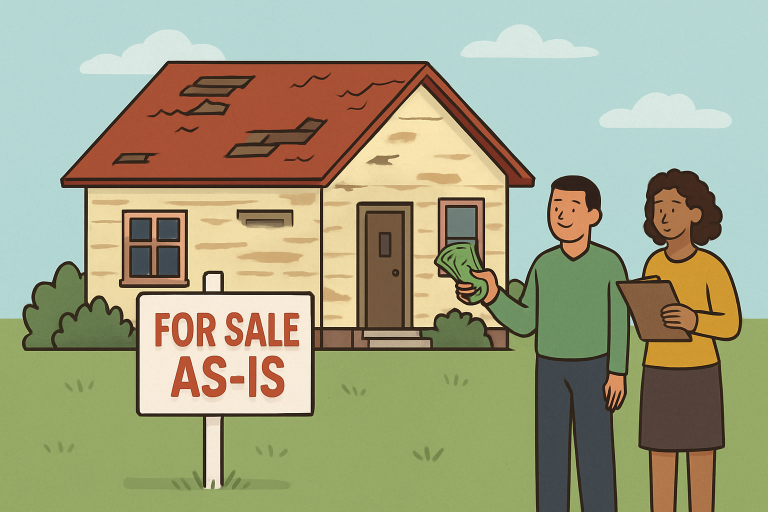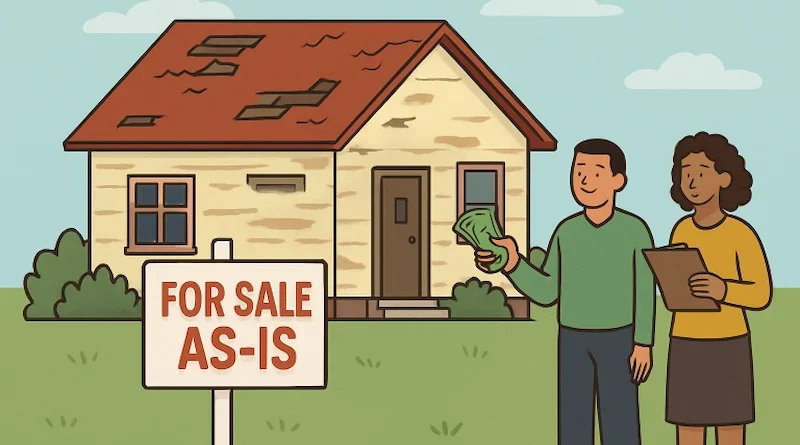Benefits of Selling Your House As-Is
Key Takeaways
- Time and Cost Savings: Avoiding repairs can lead to a quicker sale and reduced expenses.
- Attracting Specific Buyers: Investors and cash buyers often seek as-is properties.
- Simplified Selling Process: Fewer negotiations and a streamlined transaction.
Selling your home can be exciting and overwhelming—especially when faced with decisions about repairs, renovations, and preparing your property for the market. For those dealing with problem properties, opting to sell your home “as-is” means listing it in its current condition, without making any repairs or updates. This method can have various advantages, particularly for homeowners who want to avoid the stress and expense of prepping their house for sale.
Choosing to sell as-is with the help of a reputable company offers homeowners a path to a hassle-free experience. It allows you to sidestep the burden of repairs and jump to the next chapter—whether that’s moving to a new home, downsizing, or just freeing yourself from ongoing property maintenance. Below, we explore the most significant reasons sellers increasingly consider “as-is” sales.

Time and Cost Savings
One of the most attractive benefits of selling a home as-is is the significant savings in both time and money. Home repairs can be costly—whether dealing with plumbing issues, roof leaks, or outdated systems, expenses can quickly add up and eat into your profits. By skipping renovations, you save on labor and materials and the time it would take to complete these projects.
This approach is especially valuable for homeowners who need to sell quickly. Perhaps you’re facing a job relocation, a life change, or don’t want to deal with the drawn-out home improvement process. Listing as-is means your property sale can hit the market immediately, streamlining the path to closing. According to Forbes, selling as-is can drastically reduce a property’s time on the market, thereby minimizing ongoing costs like mortgage payments, utilities, and taxes.
Attracting Investors and Cash Buyers
Homes sold as-is condition often draw attention from real estate investors and cash buyers. These groups typically seek properties they can purchase below market value, renovate, and resell or rent. What sets them apart is their readiness to handle repairs and upgrades themselves, which relieves sellers of that responsibility.
Cash buyers, in particular, offer sellers an added level of confidence. Unlike traditional buyers who may be dependent on mortgage approvals and long appraisal processes, cash buyers can close quickly and with minimal contingencies. This greatly reduces the risk of deals falling through due to financing issues. Many investors are eager to close transactions swiftly, making them ideal partners for homeowners who value a prompt and certain outcome.
Simplified Selling Process
Another advantage of an as-is sale is its simplicity in an otherwise complex process. Without the need for extensive repairs, home staging, or time-consuming negotiations over minor defects, the transaction tends to move forward with fewer obstacles. This reduction in complexity is especially appealing if you are handling the sale remotely, managing multiple properties, or want to avoid protracted discussions about issues that buyers may discover during an inspection.
With less back-and-forth on requests for credits or repairs, the entire process—from listing to closing—is streamlined. This makes it easier for sellers to plan their next steps without uncertainty. Many homeowners find this peace of mind invaluable during an otherwise stressful time.
Legal Considerations
Selling your house as-is doesn’t mean you can avoid all disclosures. Sellers are still legally required to disclose any known issues with the property. Full transparency is a legal obligation and helps build trust with buyers and prevent future disputes. Complete and honest disclosure protects you from legal repercussions—buyers who are fully informed about the property are less likely to pursue action after the sale.
Different states and localities have various regulations about what must be disclosed in an as-is sale, so it’s wise to consult a real estate agent or attorney knowledgeable about your market. Openly communicating known problems can help facilitate a smoother transaction and ensure both parties are satisfied with the outcome.
Potential Drawbacks
While there are substantial benefits, there are also potential downsides to consider when selling your home as-is. For one, these properties often attract lower offers, as buyers will calculate the cost of necessary repairs when making their bids. If your property has significant structural or cosmetic problems, the sale price might be lower than that of a “move-in-ready” home.
In addition, the pool of potential buyers may be smaller. Some homebuyers want properties ready for immediate occupancy, so they may shy away from homes requiring substantial repairs or upgrades. This means marketing efforts might need to be adjusted toward those most likely to purchase as-is—primarily investors or bargain hunters.
Final Thoughts
Selling your house as-is delivers several unique advantages, making it a viable option for homeowners who prioritize speed, savings, and simplicity. By bypassing costly repairs and extensive negotiations, sellers can confidently and clearly focus on their next steps. As long as you’re transparent with disclosures and set realistic expectations, an as-is sale can save you time, reduce stress, and provide the flexibility to transition smoothly.
Visit the rest of the site for more interesting and useful articles.

